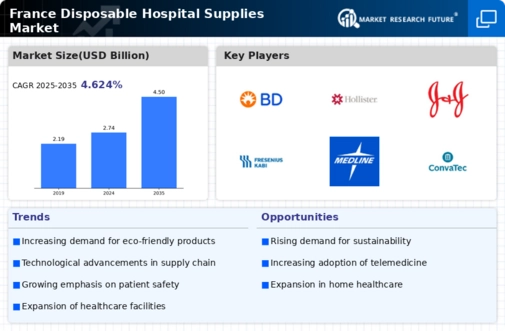Rising Demand for Infection Control
The disposable hospital-supplies market experiences a notable increase in demand driven by the heightened focus on infection control within healthcare settings. Hospitals and clinics are increasingly adopting disposable products to minimize the risk of cross-contamination and ensure patient safety. This trend is particularly evident in surgical environments, where the use of sterile, single-use items is essential. According to recent data, the market for disposable surgical supplies in France is projected to grow at a CAGR of approximately 6.5% over the next five years. This growth reflects a broader commitment to maintaining high standards of hygiene and safety, which is crucial in the current healthcare landscape. As a result, manufacturers are innovating to provide a wider range of disposable products that meet stringent safety regulations, thereby enhancing the overall efficacy of infection control measures.
Cost Efficiency and Resource Management
Cost efficiency remains a critical driver in the disposable hospital-supplies market, as healthcare facilities seek to optimize their budgets while maintaining quality care. The use of disposable supplies can significantly reduce costs associated with sterilization and reprocessing of reusable items. Hospitals in France are increasingly recognizing that investing in disposable products can lead to long-term savings, particularly in high-turnover areas such as emergency departments and outpatient clinics. A recent analysis indicates that hospitals can save up to 30% in operational costs by transitioning to disposable supplies. This financial incentive encourages healthcare providers to adopt disposable solutions, which not only streamline operations but also enhance patient throughput. Consequently, the disposable hospital-supplies market is likely to see sustained growth as facilities prioritize cost-effective resource management strategies.
Regulatory Standards and Quality Assurance
Regulatory standards play a crucial role in the disposable hospital-supplies market, as compliance with stringent quality assurance measures is essential for product acceptance in healthcare settings. In France, regulatory bodies enforce rigorous guidelines to ensure that disposable medical supplies meet safety and efficacy standards. This regulatory environment compels manufacturers to invest in quality control processes and certifications, thereby enhancing the overall reliability of their products. As healthcare providers prioritize compliance with these regulations, the demand for certified disposable supplies is likely to increase. Recent data indicates that the market for regulated disposable products is projected to grow by approximately 4% annually, reflecting the ongoing commitment to patient safety and quality care. This trend underscores the importance of adhering to regulatory standards in fostering trust and confidence in the disposable hospital-supplies market.
Aging Population and Increased Healthcare Needs
The demographic shift towards an aging population in France significantly impacts the disposable hospital-supplies market. As the elderly population grows, there is a corresponding increase in healthcare needs, including more frequent hospital visits and longer stays. This demographic trend drives demand for a wide range of disposable medical supplies, from wound care products to incontinence items. Recent statistics suggest that the population aged 65 and older is expected to reach 20% by 2030, further amplifying the need for efficient healthcare solutions. Consequently, healthcare providers are increasingly relying on disposable supplies to cater to the specific needs of this demographic, ensuring that they receive appropriate care without compromising on hygiene and safety. This shift is likely to sustain growth in the disposable hospital-supplies market as facilities adapt to changing patient demographics.
Technological Innovations in Product Development
Technological advancements play a pivotal role in shaping the disposable hospital-supplies market, as manufacturers leverage innovation to enhance product performance and safety. The introduction of advanced materials and manufacturing techniques has led to the development of more effective and reliable disposable products. For instance, the integration of smart technologies in disposable devices, such as sensors and tracking systems, is becoming increasingly prevalent. These innovations not only improve patient outcomes but also facilitate better inventory management within healthcare facilities. In France, the market for technologically advanced disposable supplies is expected to expand, with projections indicating a growth rate of around 5% annually. This trend underscores the importance of continuous innovation in meeting the evolving needs of healthcare providers and patients alike.




















Leave a Comment